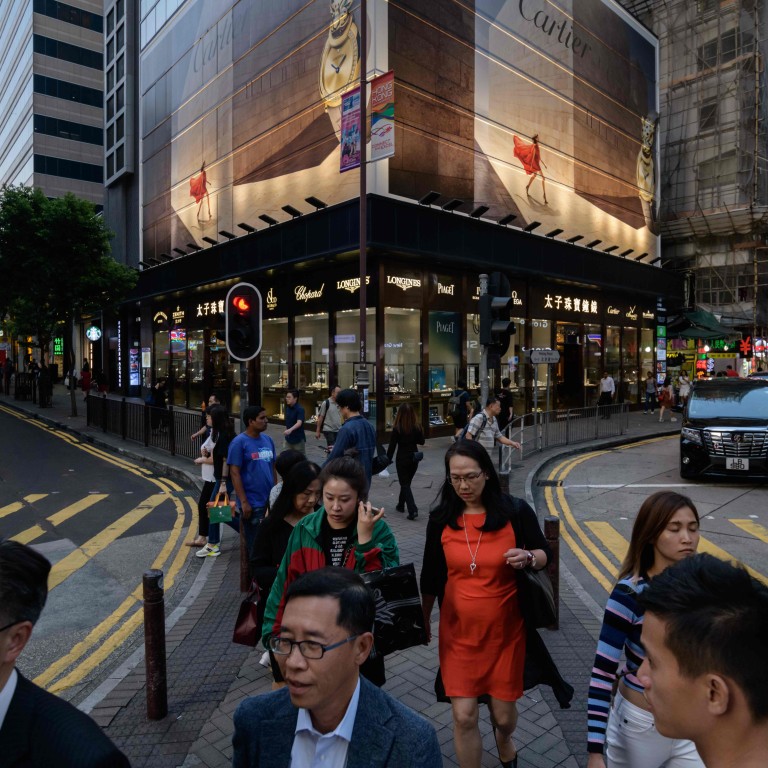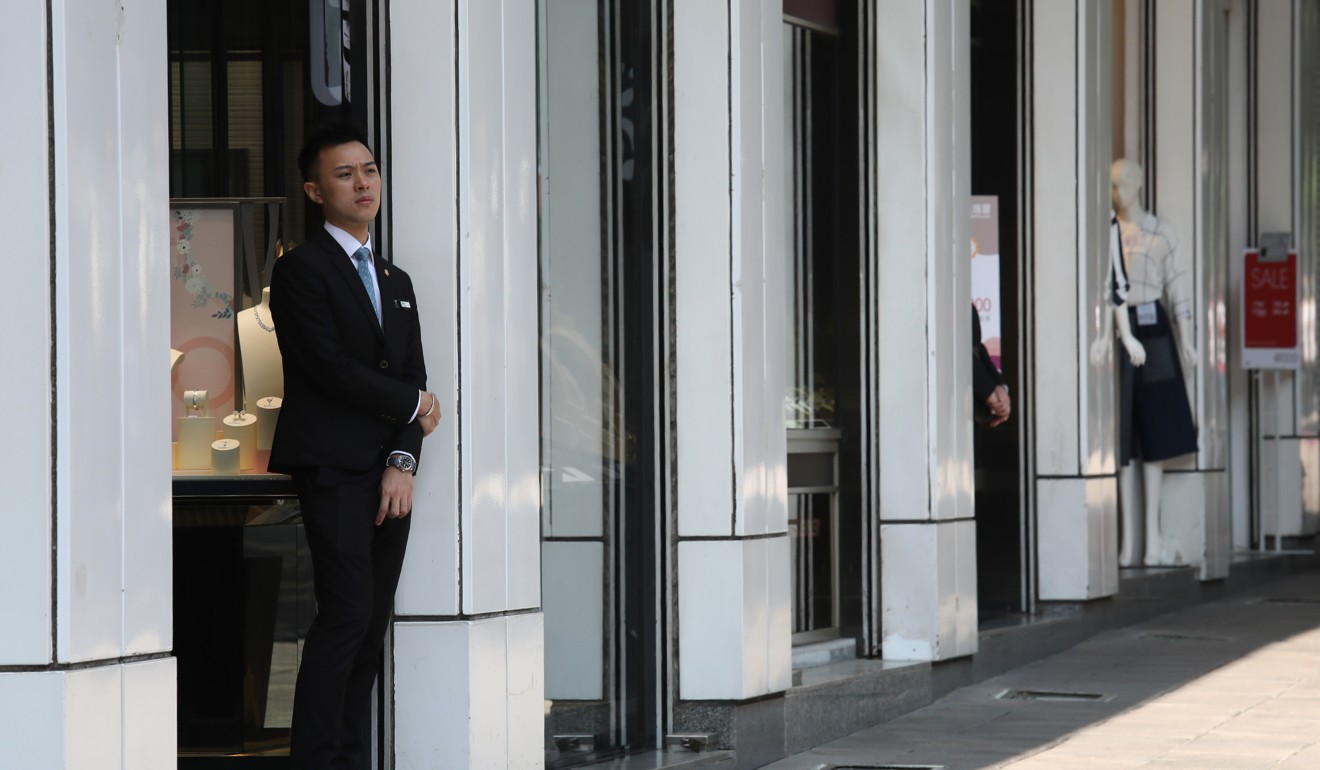
Holiday season brings little cheer for Hong Kong businesses hit hard by months of protest turmoil
- Retailers could suffer at least a 15 per cent decline in revenues, experts say, and restaurant profits could fall as much as 30 per cent
- Veteran restaurateur says this Christmas season is the worst he has seen in over 50 years in the industry
Industry leaders and analysts predict holiday business to fall sharply year-on-year, with tourist arrivals expected to drop as much as 40 per cent during the festive season. Retailers could suffer at least a 15 per cent decline in revenues, the experts said, and restaurant profits could fall as much as 30 per cent.
German firms committed to Hong Kong but doubt unrest will end soon
Tourism lawmaker Yiu Si-wing estimated the number of arrivals to Hong Kong during the Christmas holiday would drop 30 to 40 per cent, a drop he described as the steepest since the 1997 handover.
“Even during Sars, the effects only took place in the first half of the year. There hasn’t ever been such a drop for Christmas,” Yiu said, referring to the 2003 outbreak of severe acute respiratory syndrome.
Yiu said the city’s hotel occupancy rates were higher than 90 per cent at this time last year, but this year accommodation in protest zones – such as Tsim Sha Tsui and Mong Kok – would likely be around 30 to 40 per cent. He said other areas in the city could reach 70 to 80 per cent occupancy.
He said that last year a room at a three or four-star hotel could cost more than HK$1,200 (US$153), but this Christmas season prices could drop 30 to 50 per cent.

Hong Kong’s anti-government protests have transformed from peaceful demonstrations into outbreaks of violence, notably in tourist, commercial and residential districts. More than 40 countries and regions have issued travel warnings or alerts about the city.
Alice Chan Cheung Lok-yee, of the Travel Industry Council, said she expected an average of 40 mainland tour groups to arrive each day in the holiday season, similar to November, because Christmas is not a holiday season for mainland visitors.
Even so, that would still be a huge drop from the same time last year when she said 277 groups visited Hong Kong on December 25 and 334 groups visited on December 26.
German firms committed to Hong Kong but doubt unrest will end soon
A similar slump was seen in visitors from other nations, according to Paul Chan Chi-yuen, co-founder of guided-tour company Walk in Hong Kong.
Chan said up to 70 per cent of bookings for individual visitors, mainly from the United States, were cancelled for Christmas and New Year.
“The political unrest will subside a bit, but the situation is going to be the new normal,” he said.
To boost attendance, the Ocean Park amusement attraction gave exclusive offers to residents, allowing them to buy two tickets for HK$700, almost 30 per cent below the original price. It also launched a new ride called “Wild Twister”.

Lantau Island’s cable car attraction Ngong Ping 360 also lowered prices, offering a round-trip ticket for HK$30 for children, a deduction of HK$80.
Hong Kong Disneyland Resort offered 15 per cent off for locals who buy three annual passes.
Simon Wong Ka-wo, president of the Hong Kong Federation of Restaurants and Related Trades, said this Christmas season was the worst he had seen in over 50 years in the industry.
Wong said the city’s revenues could drop 30 per cent over the holidays, compared with last year, because residents would be reluctant to dine out and less visitors would be here to spend cash. He predicted that Hong Kong’s restaurant would lose HK$3.5 billion in December.
“If December continues to be this bad, I don’t know how many restaurants can survive the Lunar New Year [in January],” he said.
But economist Andy Kwan Cheuk-chiu, director of ACE Centre for Business and Economic Research, said retail sales in December would not be as bad as some expected. He said sales would fall around 15 to 20 per cent compared to last year.
Still, it could still be the worst year-on-year decline since 1998, he said. That year, sales dropped 17 per cent.
Michael Cheng, the PwC consumer markets leader for Asia-Pacific, mainland China and Hong Kong, estimated that retail sales would drop 18 per cent in December.
He said the hardest-hit sectors would be luxury goods, including jewellery, watches and electronic products. He said many major brands were slashing prices earlier than in previous years.
Hong Kong’s small businesses consider backup offices in Kowloon as they look to relocate from protest hotspots
“The direction is to take advantage of the more peaceful situation this month to strive for more business,” he said. “But the growth rate would not be huge when Hong Kong has to rely on domestic sales. Without tourists, we would suffer.”
Alan Cheung Ho-lun, the 40-year-old owner of Sands Medicine Shop in Wan Chai, estimated that his December revenues would be cut in half at least. He said his shop usually made more than HK$15,000 per day during the same period last year.
“I had to delay my rent payment. I really have no money. I am not joking,” Cheung said.
He said mainland visitors were his main customers. Now, he must resort to selling his goods on WeChat, the online messaging platform, and mailing the products to his clients across the border.
A small number of local businesses are banking on the pro-democracy movement and have benefited from sharing the political views of protesters.
Charles Yip, the owner of Let’s Jam had “Lennon Walls” in his two restaurants so guests could write pro-democracy comments on Post-it stickers. He predicted that his eateries would be full during the holiday season.
“Our income on normal weekends is equal to the revenue during last Christmas,” he said, adding that he was even considering opening a new branch.
Additional reporting by Denise Tsang

